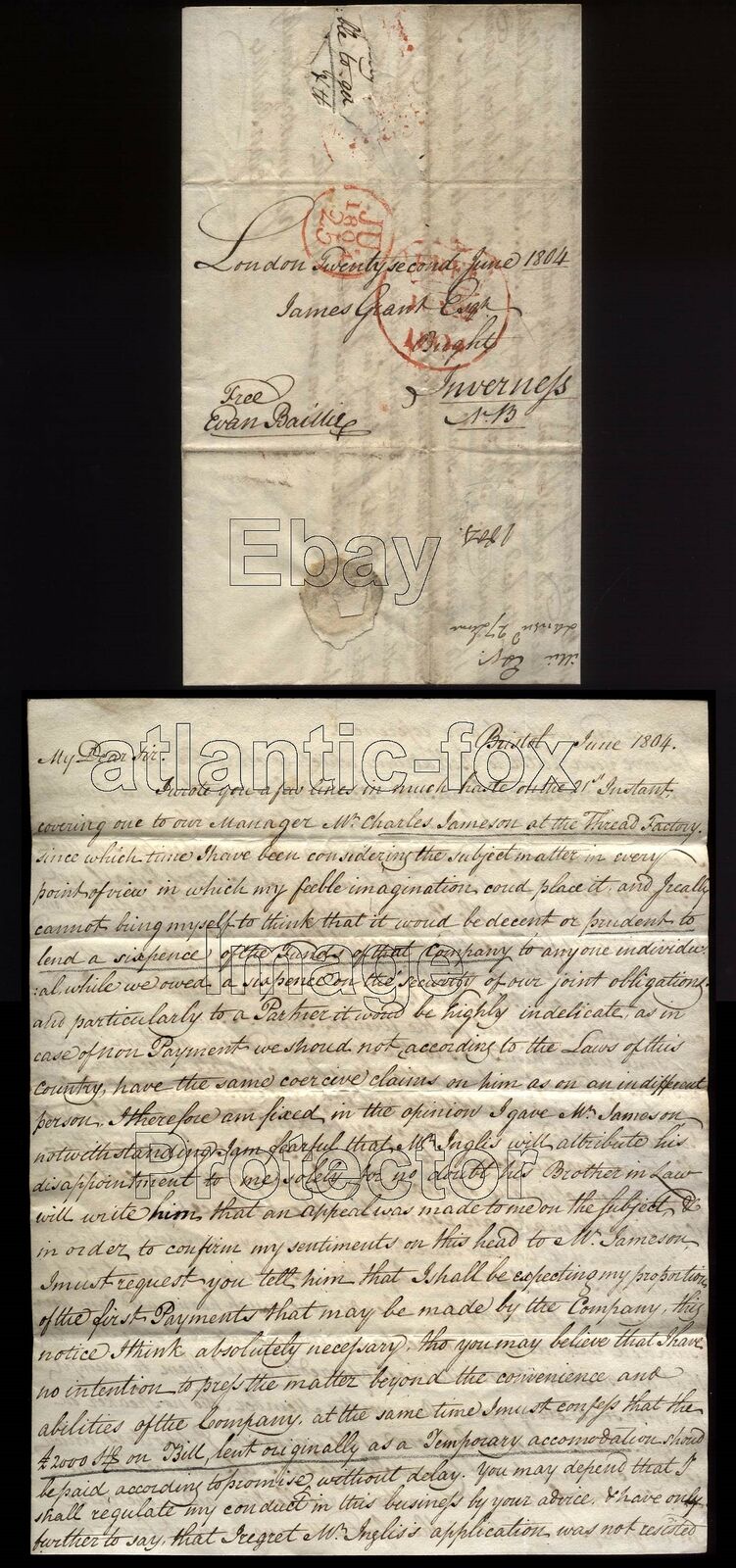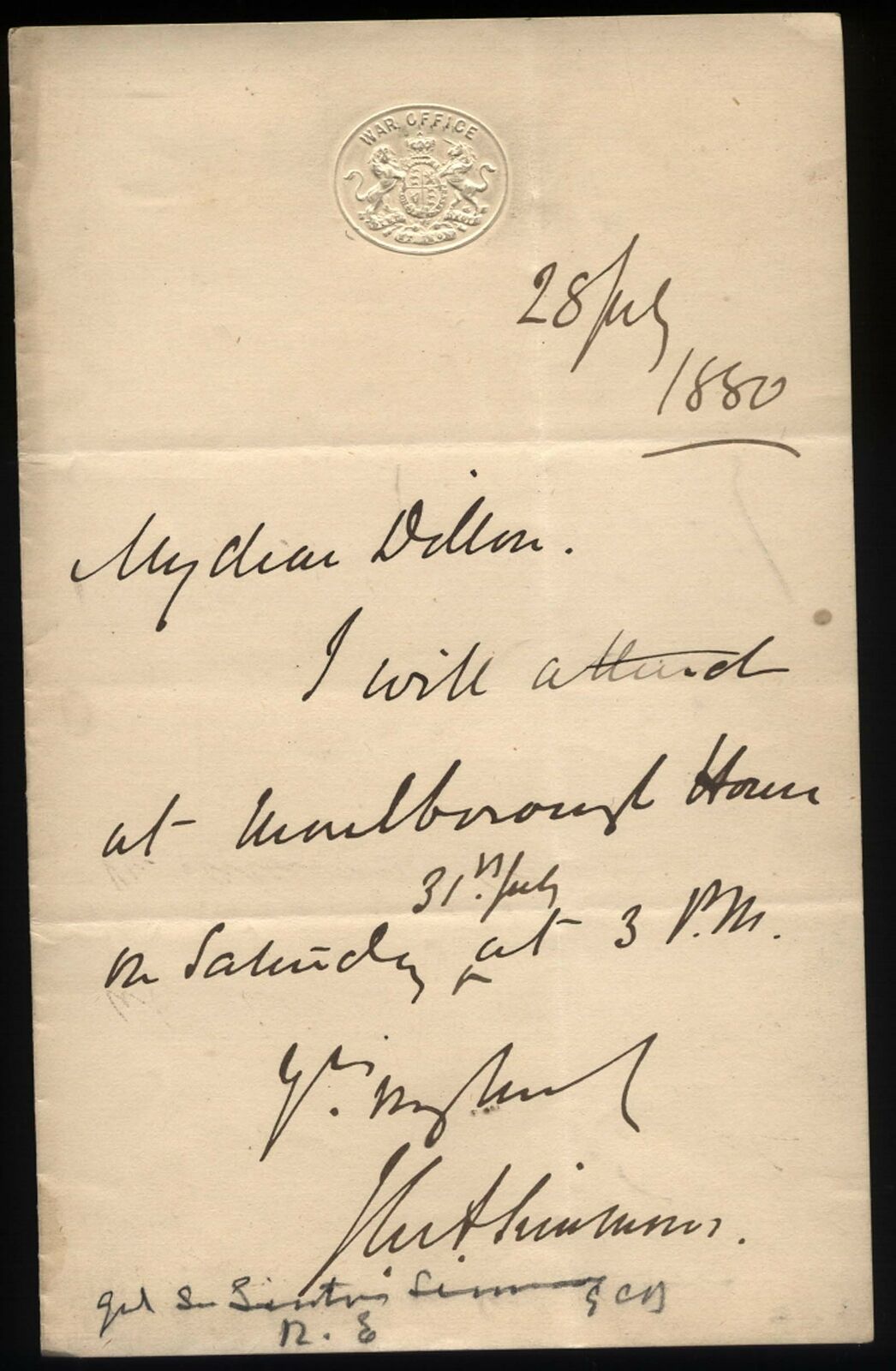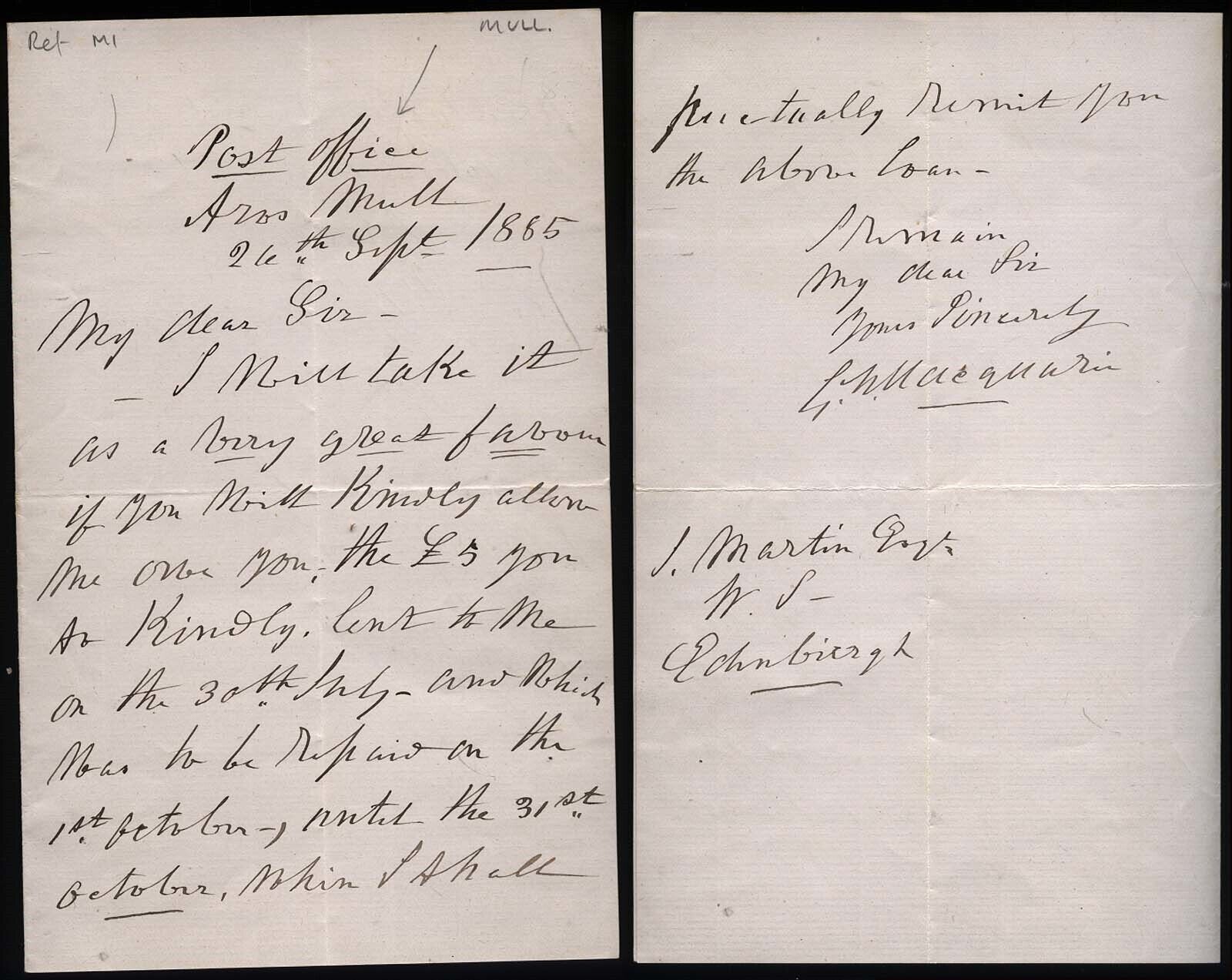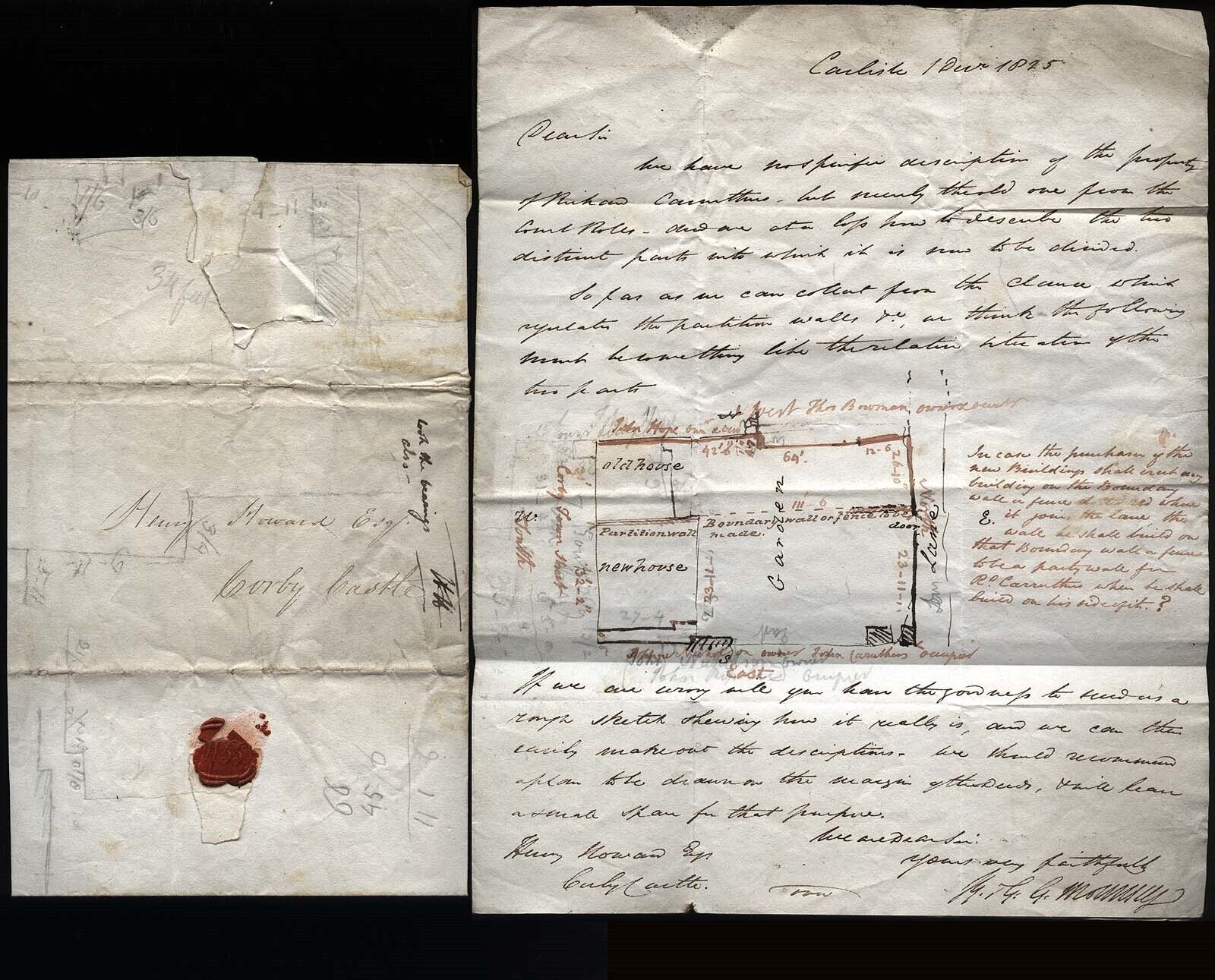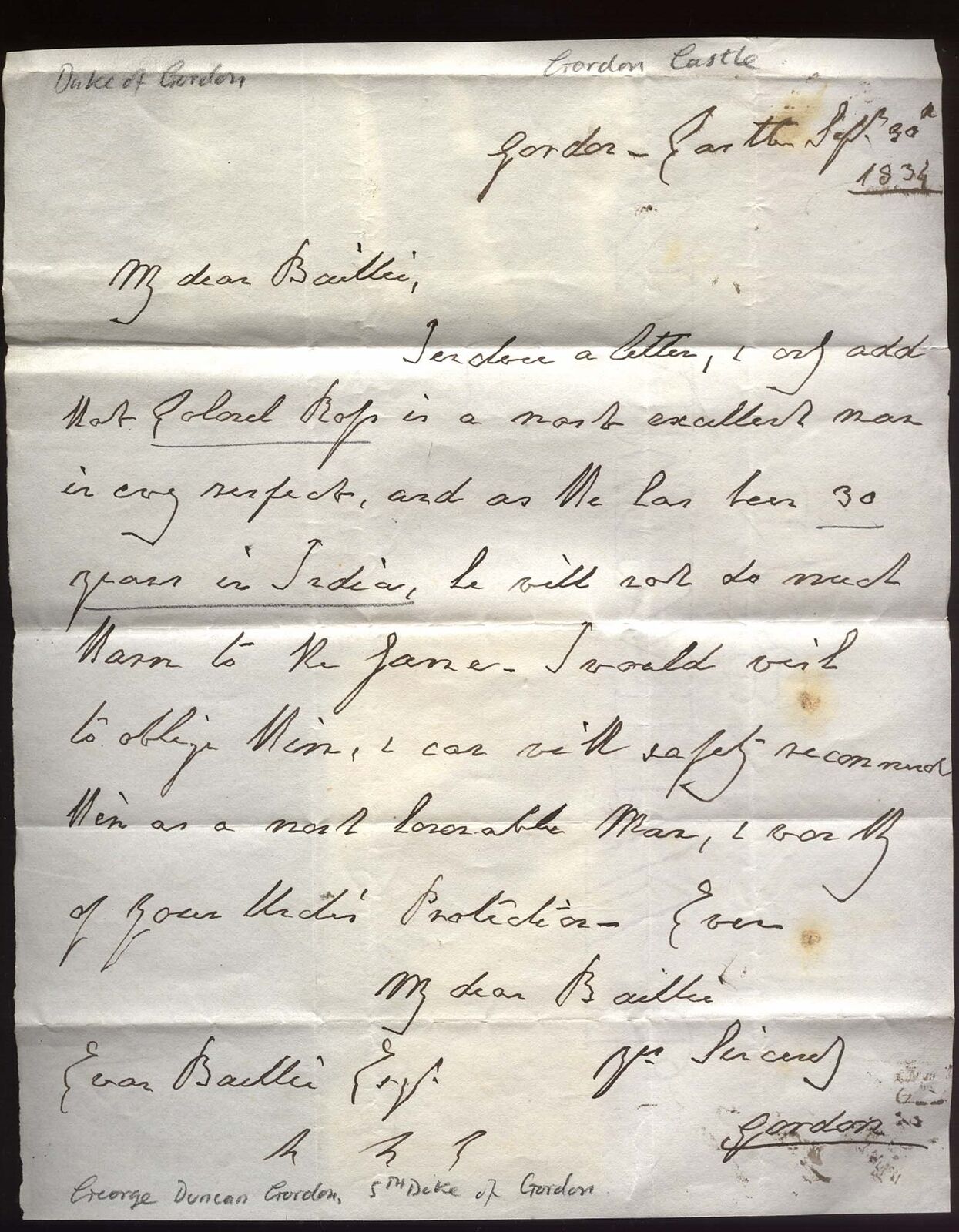-40%
1804 LONDON FREE letter EVAN BAILLIE M.P.of DOCHFOUR, African Slave Trade, etc
$ 159.95
- Description
- Size Guide
Description
1804 LONDON FREE letter EVAN BAILLIE M.P.of DOCHFOUR, African Slave Trade, etcThis product data sheet is originally written in English.
1804
LONDON
FREE headed "Bristol" June, but posted in London, Fine & fascinating three page letter from
EVAN
BAILLIE
of
DOCHFOUR
, in which he mentions improvements to be made at
DOCHFOUR
ESTATE, Inverness-shire, Not to lend money to the Thread Factory in Inverness, , Lord
Macdonald's
Family, St Vincent Estate and Sugar, and an interesting section were he mentions the proposed abolition of the African Slave Trade, and at the time of writing he considers it the greatest possible evil to befall the West Indies, but the Fanatics are pushing for abolition, our worthy Member tho no speaker on the Question is never the less one of it's warmest supporters, which is very contrary to our Cousin Red Castles assurances to me. Mr
Pitt
and Election matters, and pray what part do the Chisholm and Culloden take in the Politics etc.
Evan
Baillie
(1741 – 28 June 1835) was a British West Indies merchant, landowner and Whig politician,
M
.P. for
BRISTOL
, who sat in the House of Commons from 1802 to 1812.
Baillie
was the third son of Hugh
Baillie
of
Dochfour
, Inverness and his wife
Emilia
Fraser, the daughter of Alexander Fraser. His early life was obscure and he suffered "fatal neglect" in formal education. He entered the army in early life and served in part of the American war.
He was first in the West Indies in 1759–60, serving with the 4th Foot in Martinique, as his 1835 Inverness Courier obituary makes clear.
Baillie
himself seems to have been a staff officer to General Howe at the Siege of Havana in the adjutant's department. He then transferred to the 19th Regiment (later the Green
Howards
) as a lieutenant, and retired on half-pay. He then seems to have spent most of the next 15 years in partnership with his brothers, Alexander and James, who had begun a partnership in St
Kitts
known as Smith and
Baillies
, which was eventually based in Grenada and later in St Vincent as the partnership of
Garraway
and
Baillie
. A 1779 letter from his brother James to his cousin, William
Baillie
of
Dunain
, then serving in India,[3] indicates that he had returned to Britain in about 1774 and settled in Bristol.
Alves
also indicates that he was believed in 1775 to have married in the West Indies, marrying Mary
Gurley
of St
Peter's
Hope, St Vincent, in 1777. He founded what became the firm of
Evan
Baillie
, Son & Co in Bristol, and was a common councilman for Bristol in 1785. He was sheriff of Bristol for 1786–87 but declined becoming mayor.
In 1789 he was member of a committee of merchants to defend the slave trade, in all branches of which he had from time to time invested and financed.
During the French Revolutionary War he raised the Bristol Volunteer Infantry in 1797 and served as their Lieutenant-Colonel (
Colonel
in 1798). After the short-lived Peace of
Amiens
he re-raised them as the Royal Bristol Volunteer Infantry.
On the death of his brother Alexander in 1798 Baillie succeeded to the family estates in Inverness-shire. He was also partner in an Inverness hemp manufacturers and other businesses. He continued to purchase more land in Scotland as a result of concerns about the effects of the war with France and effects of abolition of slavery.
In 1802 Baillie became an alderman of Bristol. Also in 1802, he was elected unopposed as Member of Parliament for Bristol. He was unopposed again in 1806 and 1807.
He noted how feeble were attempts in parliament to oppose slave trade abolition bill but he was not among those who made last stand against it.
By 1811, he was suffering poor health and was concerned for his son Peter (by then MP for the Inverness burghs) who died in 1812. He therefore decided not to stand in the 1812 election.
Baillie retired to Scotland and left the business operations to his sons. He resigned as alderman of Bristol in 1821 pleading old age, but survived to the age of 94.
His wife Mary Gurley was the daughter of Peter Gurley of St. Vincent. Their sons Peter Baillie, Hugh Duncan Baillie and James Evan Baillie all became members of parliament. Baillie's brother James Baillie was also an MP and West Indies merchant.
Below FURTHER INFORMATION ON THE BAILLIE family of DOCHFOUR
The trading house of Alexander, James and Evan Baillie operated in St Kitts from 1770. Evan later joined in the wave of expansion in trade around 1800, primarily in Demerara. He had by then established himself in Bristol, serving as its MP [1802-1812] and subsequently became more involved with the family’s Scottish estates. His son Peter [born in St Vincent] became MP for Inverness burghs (Inverness, Fortrose, Forres, Nairn) as a result of Evan’s influence.
Evan had inherited the Dochfour estate, where he died at the age of 95 in 1835.
Inverness Courier, 1835
July 29.—This issue contains a memorial sketch of Mr Evan Baillie of Dochfour, who had recently passed away at the age of 95. "He had witnessed the battle of Culloden, when a boy, from the heights above Dochfour; he had served in the army in the reign of George the Second; he was three times returned as representative in Parliament for the ancient city of Bristol; he was one of the very few men in our day who has met at one interview with Burke, Johnson, and Reynolds; and after a long, active, and successful public life, he had the rare felicity to return to his native country, blessed with health and affluence, to spend the evening of his days in quiet retirement among the scenes of his birth." Going into details, the writer states that Mr Baillie entered the army as ensign at the age of fifteen, and was employed on active service abroad, especially in the West Indies. He was at the siege of Havannah in 1762. On the restoration of peace, seeing no prospect of promotion, he retired from the army, and embarked in the West Indian trade, finally settling at Bristol, which he afterwards represented in Parliament. By the death of his elder brother in 1799, Mr Baillie succeeded to the family property of Dochfour, and resided there during the last twenty years of his life. "Mr Baillie was a perfect model of the gentleman of the old school; tall and handsome in his person, of polished manners and of the most punctilious honour and correctness in all his transactions and intercourse with society."
FURTHER INFOMATION BELOW
1806 Evan Baillie* of Dochfour, Inverness, the wealthy head of a Bristol-based West Indian trading house, made a bargain with Sir Alexander Munro for the support of Fortrose at the next general election, when that burgh would have the return. Baillie’s nephew James Grant of Bught, his partner in local hemp and thread manufacturing concerns, was now provost of Inverness, and at the dissolution of 1807 they promoted the candidature of Baillie’s son Peter, who had visited the area the previous winter. Lord Melville, who seems to have been erroneously informed that Sir James Grant still had the final say in Inverness, directed that neither Baillie nor Rothiemurchus was to be encouraged. He wanted the seat to go to the new lord advocate, Archibald Campbell Colquhoun*, or to George Cumming, if Colquhoun could be placed elsewhere. Pressure was put on Bught to accommodate Colquhoun, but he refused to do so. Baillie’s path was still not clear. Bught considered Sir Alexander Munro to be a ‘vapouring character’ who ‘builds too much on supposed influence where in fact he has little’ and was not surprised, though disappointed, to learn from Baillie that Munro was making late difficulties about the terms of his support
:
Powered by SixBit's eCommerce Solution
1804 LONDON FREE headed "Bristol" June, but posted in London, Fine & fascinating three page letter from EVAN BAILLIE of DOCHFOUR, in which he mentions improvements to be made at DOCHFOUR ESTATE, Inverness-shire, Not to lend money to the Thread Factory in Inverness, , Lord Macdonald's Family, St Vincent Estate and Sugar, and an interesting section were he mentions the proposed abolition of the African Slave Trade, and at the time of writing he considers it the greatest possible evil to befall the West Indies, but the Fanatics are pushing for abolition, our worthy Member tho no speaker on the Question is never the less one of it's warmest supporters, which is very contrary to our Cousin Red Castles assurances to me. Mr Pitt and Election matters, and pray what part do the Chisholm and Cullode
Related Interest 2
Baillie of Dochfour
Family Surname
Baillie
Postmark Type
FREE Franking Handstamps
EAN
Does Not apply
Region
Scotland
Destination
Inverness
Scotland County
Inverness-shire
City/Town/Village/Place
London
England County
Middlesex
Era
1800-1810
Addressed to
James Grant of Bught
Letter From
Evan Baillie M.P.
Document Type
Manuscript posted letter
Year of Issue
1804
Related Interests 2
African Slave Trade
